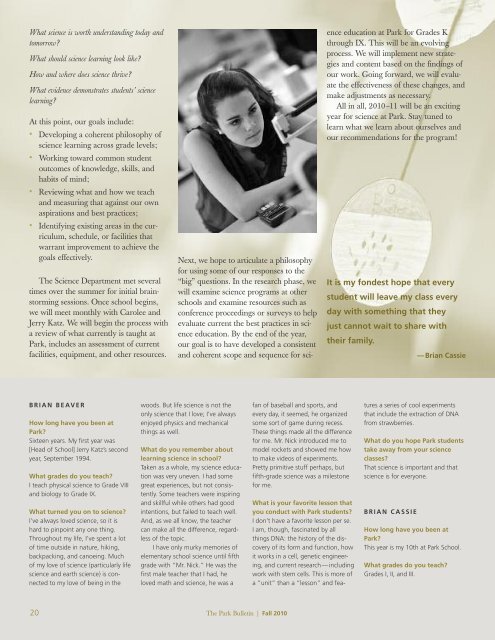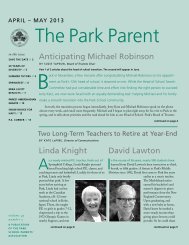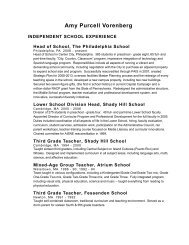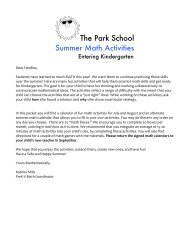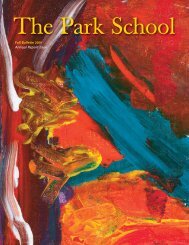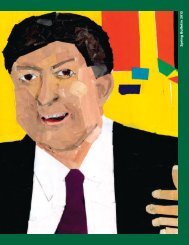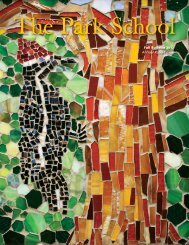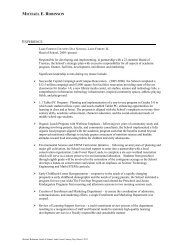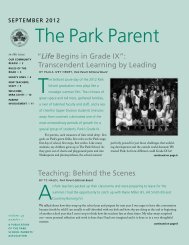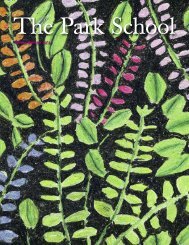What science is worth understanding today andtomorrow?What should science learning look like?How and where does science thrive?What evidence demonstrates students’ sciencelearning?At this point, our goals include:• Developing a coherent philosophy ofscience learning across grade levels;• Working toward common studentoutcomes of knowledge, skills, andhabits of mind;• Reviewing what and how we teachand measuring that against our ownaspirations and best practices;• Identifying existing areas in the curriculum,schedule, or facilities thatwarrant improvement to achieve thegoals effectively.<strong>The</strong> Science Department met severaltimes over the summer for initial brainstormingsessions. Once school begins,we will meet monthly with Carolee andJerry Katz. We will begin the process witha review of what currently is taught at<strong>Park</strong>, includes an assessment of currentfacilities, equipment, and other resources.Next, we hope to articulate a philosophyfor using some of our responses to the“big” questions. In the research phase, wewill examine science programs at otherschools and examine resources such asconference proceedings or surveys to helpevaluate current the best practices in scienceeducation. By the end of the year,our goal is to have developed a consistentand coherent scope and sequence for scienceeducation at <strong>Park</strong> for Grades Kthrough IX. This will be an evolvingprocess. We will implement new strategiesand content based on the findings ofour work. Going forward, we will evaluatethe effectiveness of these changes, andmake adjustments as necessary.All in all, 2010–11 will be an excitingyear for science at <strong>Park</strong>. Stay tuned tolearn what we learn about ourselves andour recommendations for the program!It is my fondest hope that everystudent will leave my class everyday with something that theyjust cannot wait to share withtheir family.—Brian CassieB R I A N B E AV E RHow long have you been at<strong>Park</strong>?Sixteen years. My first year was[Head of <strong>School</strong>] Jerry Katz’s secondyear, September 1994.What grades do you teach?I teach physical science to Grade VIIIand biology to Grade IX.What turned you on to science?I’ve always loved science, so it ishard to pinpoint any one thing.Throughout my life, I’ve spent a lotof time outside in nature, hiking,backpacking, and canoeing. Muchof my love of science (particularly lifescience and earth science) is connectedto my love of being in thewoods. But life science is not theonly science that I love; I’ve alwaysenjoyed physics and mechanicalthings as well.What do you remember aboutlearning science in school?Taken as a whole, my science educationwas very uneven. I had somegreat experiences, but not consistently.Some teachers were inspiringand skillful while others had goodintentions, but failed to teach well.And, as we all know, the teachercan make all the difference, regardlessof the topic.I have only murky memories ofelementary school science until fifthgrade with “Mr. Nick.” He was thefirst male teacher that I had, heloved math and science, he was afan of baseball and sports, andevery day, it seemed, he organizedsome sort of game during recess.<strong>The</strong>se things made all the differencefor me. Mr. Nick introduced me tomodel rockets and showed me howto make videos of experiments.Pretty primitive stuff perhaps, butfifth-grade science was a milestonefor me.What is your favorite lesson thatyou conduct with <strong>Park</strong> students?I don’t have a favorite lesson per se.I am, though, fascinated by allthings DNA: the history of the discoveryof its form and function, howit works in a cell, genetic engineering,and current research—includingwork with stem cells. This is more ofa “unit” than a “lesson” and featuresa series of cool experimentsthat include the extraction of DNAfrom strawberries.What do you hope <strong>Park</strong> studentstake away from your scienceclasses?That science is important and thatscience is for everyone.B R I A N C A S S I EHow long have you been at<strong>Park</strong>?This year is my 10th at <strong>Park</strong> <strong>School</strong>.What grades do you teach?Grades I, II, and III.20 <strong>The</strong> <strong>Park</strong> Bulletin | Fall 2010
What turned you on to science?I have been passionately interestedin science for as long as I canremember. My earliest recollectionsare of searching for and then raisingthe caterpillars of black swallowtails,monarchs, and cecropia moths, so Iguess lepidoptera probably turnedme on first.What do you remember aboutlearning science in school? Anyfavorite stories to share?I took science for the first time in thesixth grade, but it is my seventhgradescience class I remember mostvividly. My teacher was a real meanieand my whole year of life science,my favorite scientific field, wasdreadful. When I got to high school,I had biology again in 10th grade.Yea! Except for the fact that myseventh-grade teacher transferredto the high school and was now myscience teacher. Good grief. SomehowI survived.What is your favorite lesson thatyou conduct with <strong>Park</strong> students?My favorite classes are right at thestart of Grade III, in September andOctober, when my students and I gooutside and watch the skies over the<strong>Park</strong> <strong>School</strong> campus for migratinginsects and birds. We make predictionsbased on the weather, but wenever know what we are going tofind. One day, we saw 1,400 monarchs[butterflies] fly over <strong>Park</strong>. Thatwas the highest count from anyschool in the country that year.What do you hope <strong>Park</strong> studentstake away from your scienceclasses?It is my fondest hope that every studentwill leave my class every daywith something that they just cannotwait to share with their family.H E AT H E R O F F E NHow long have you been at<strong>Park</strong>?I am starting my third year at <strong>Park</strong>this year.What grades do you teach?All of Grade IV and V science andone section of sixth-grade science.What turned you on to science?My father encouraged me to takethe science electives my elementaryand middle schools offered. In fifthgrade, I was able to take coastalecology and “starwalk” (astronomy)classes, which were wonderful. Inseventh grade, I reluctantly agreedto take an elective chemistry classand after the first day, I loved it!That pretty much sealed my love forall sciences.What do you remember aboutlearning science in school?I don’t remember much science fromelementary school, other then studyingdinosaurs in the second grade.My middle-school science years arewhat have stuck with me the most.I remember growing beautiful,turquoise blue copper sulfate crystalsin seventh grade and raising brineshrimp babies in eighth grade. Mylab partners and I tried to namethem all! By the end of the lab wehad a list of about 250 names.What is your favorite lesson thatyou conduct with <strong>Park</strong> students?Hard question! I love teaching aboutconstellations to the fourth-graders,helping them to find the ‘pictures inthe sky’ (a nice tie-in to Greekmythology, too!). <strong>The</strong> fifth-gradersthink its cool learning how to light abulb with one wire and a battery.And, in sixth grade, it would probablybe singing “<strong>The</strong> Bloodmobile”song by <strong>The</strong>y Might Be Giants as thestudents, dressed as red blood cells,walk though a giant model of theheart, picking up and dropping offoxygen.What do you hope <strong>Park</strong> studentstake away from your scienceclasses?I hope by the time they move to theUpper Division, my students feel preparedfor their future science classes.Many of my classmates growing upwere intimidated or overwhelmed byscience. But, science is all around usand is what makes the world turn;if my students understand andappreciate that, I have succeeded asa teacher.R E B E C C A R E G E RHow long have you been at<strong>Park</strong>?I’m beginning my sixth year.What grades do you teach?Seventh-grade earth science andeighth-grade IPS (Introduction toPhysical Science).What turned you on to science?I always loved it in school. I hadgreat teachers growing up, and theymade me love science. I enjoy learningabout how things work, andwhy things happen the way they do.What do you remember aboutlearning science in school?I remember making acetylsalicylicacid—Aspirin—when I was intenth-grade chemistry, and thenresearching its properties for areport. It was my first true chemsynthesis lab, and I enjoyed thework immensely. I still love chemistry,particularly synthesis labs.What is your favorite lesson thatyou conduct with <strong>Park</strong> students?I have a lot of favorites. In seventhgrade, it’s probably making “fossils”or the “graham cracker plate tectonics”labs that we do. In eighthgrade, I love the sludge lab; it’s challenging,but it provides a chancefor students to design their ownexperiment and plan their ownwork, thus testing their knowledgeby the practical application of skillsalready learned. <strong>The</strong> students trulyappreciate what they accomplish bythe end.What do you hope <strong>Park</strong> studentstake away from your scienceclasses?I hope they gain a curiosity aboutthe world around them and thatthey learn to question how thingswork. One of the best things thatkids can take away from a scienceclass is the ability to challengeknowledge constructively. Withoutthis type of questioning, many scientificdiscoveries would never havebeen made. After a year with me, Ialso want my students to be able toexplain what they know. I’m knownfor returning homework papersmarked up with “WHY???” and“EXPLAIN!!!” in the margins.<strong>The</strong> <strong>Park</strong> Bulletin | Fall 2010 21


